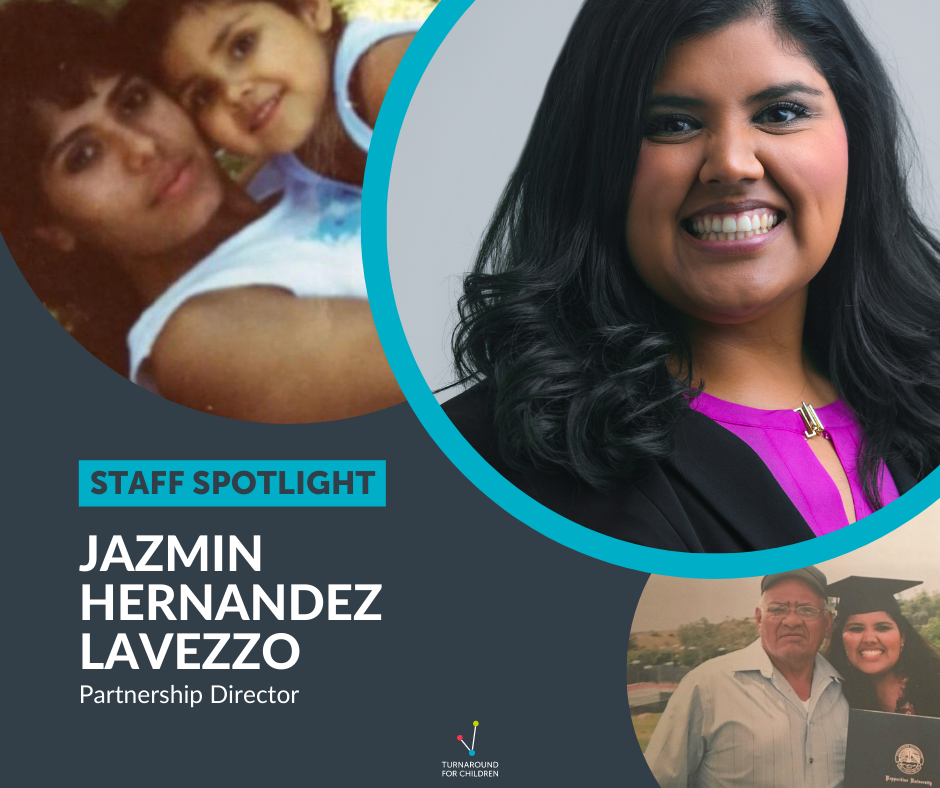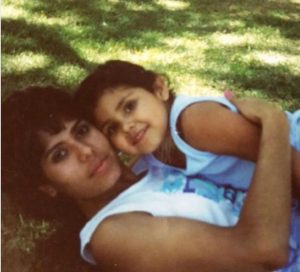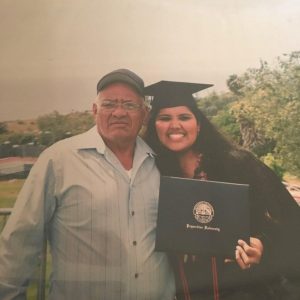What Being Latina Means to Me
This is the first blog in a new series highlighting Turnaround for Children staff. This month, we’re featuring Partnership Director Jazmin Hernandez Lavezzo in honor of Latinx Heritage Month.

By Jazmin Hernandez Lavezzo, Partnership Director
Being a Latina is core to who I am. I have so much pride and see so many positive things that I am because of my identity, my background, and my family. But getting to this place has been a journey — a journey to understand what being a Latina and being Mexican means to me. And like all journeys, there have been mountains and valleys, wild places and safe havens.
Growing up, I didn’t have a Latinx or BIPOC teacher until I was in high school. As a small child who loved school and learning, it was perplexing that none of my teachers looked like me or had the same culture as me. I absolutely adored learning and everything related to school, but there was this odd feeling that the teachers, principals, and staff didn’t look like me. (Fast forward a few years and I become a teacher!)
My high school Spanish teacher was Señorita Calderon. She grew up in the same town as I did. I looked at her and saw someone who looked like that was so smart and had a career. There was this narrative about people who looked like me and their place in our society, and she was someone who showed me that there was something different.
 There were always kids who looked like me in school, but when I started going to Advanced Placement classes in high school, there was a feeling of being othered, of not belonging. I then went to a predominantly white college where I also felt like I didn’t belong; it was a continuation of that story I was telling myself that people who looked like me had a certain place in our society. I had professors like Dr. Marshall, Dr. Williams, and Dr. Banks who saw me; they didn’t just see another student, but they saw all of me and thought that I was smart and hard working just as I was. They made me feel like I belonged. They made me feel like my journey was important. And of course, my angel mother, Mama Carmen, and my inspirational grandfather, Luis Hernandez, instilled so much power and hope, and they had this belief that my journey was different and important. I had the love and support of my entire family, important teachers, and a strong friend group who saw all of me and helped me on my own journey.
There were always kids who looked like me in school, but when I started going to Advanced Placement classes in high school, there was a feeling of being othered, of not belonging. I then went to a predominantly white college where I also felt like I didn’t belong; it was a continuation of that story I was telling myself that people who looked like me had a certain place in our society. I had professors like Dr. Marshall, Dr. Williams, and Dr. Banks who saw me; they didn’t just see another student, but they saw all of me and thought that I was smart and hard working just as I was. They made me feel like I belonged. They made me feel like my journey was important. And of course, my angel mother, Mama Carmen, and my inspirational grandfather, Luis Hernandez, instilled so much power and hope, and they had this belief that my journey was different and important. I had the love and support of my entire family, important teachers, and a strong friend group who saw all of me and helped me on my own journey.
When I became a teacher in Huntington Park in southeast Los Angeles, every single one of my students was Latinx, and it was the first place in my life besides being with my family, that I felt like I truly belonged. It was really beautiful to connect with students around their culture and to do home visits and see that we had similar homes, that we ate similar foods, and that we had similar traditions. For example, over the winter holidays my students would talk about making tamales with their families, and that’s something I’ve always done with my family. I loved seeing the faces of delight when my students realized we were the same and when they realized that they could be their entire self in school because we were the same. Those moments I will never forget and they fuel me each day.
However, that feeling of joy was often coupled with a feeling of sadness because I didn’t have that growing up — I never saw myself or my culture reflected back to me by my teachers. I wonder if maybe I would have moved faster on this journey of mine if I had had teachers and leaders who looked like me. I am at this destination of pride now.
For many years, I tried to separate my Latina identity from my professional identity because my workplaces were led in ways that perpetuated white dominant norms. It felt like being a Latina didn’t fit into those spaces. I spent years feeling like I couldn’t be my true self at work, because so much of who I am is being Latina, being Mexican, being a Mexican-American woman.

Now, I feel accepted for my whole self, and I feel valued and respected. I feel valued not just for what’s on my professional resume but for who I am as a person, all of my identities and culture, and how that allows me to show up in the workplace and do the work. My colleagues, my incredible manager, the CEO of my organization — they see me; they see all of me. They show me that Jazmin Hernandez Lavezzo matters and that all of me matters. I could have never imagined when I started my career or being that little girl in school that I would be asked to write a blog about being Latina and what that meant to me.
What I want for all BIPOC students, but especially for students who look like me, is to feel that pride and joy in their culture and know that their culture is an asset from the first moment they enter our educational system. I want them to know that there is no shame in their culture, but rather so many gifts and lessons that will help them and carry them through their own journeys.
I want our BIPOC youth to understand that there are people like them in the world, and that they are valued for all that they are, all that they bring. They don’t have to be something different; they are perfect just the way they are.

Share This Story